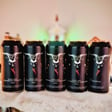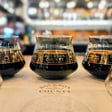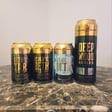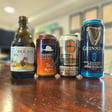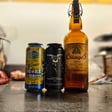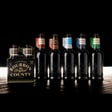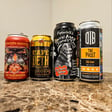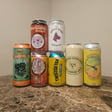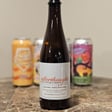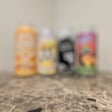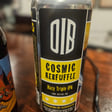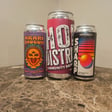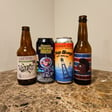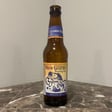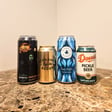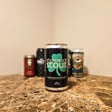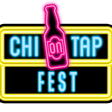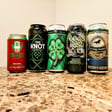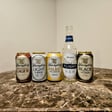Become a Creator today!Start creating today - Share your story with the world!
Start for free
00:00:00
00:00:01

Episode 113 - Conrad Seipp Brewing Co. (feat. Laurin Mack)
This week we're joined by Laurin Mack of Conrad Seipp Brewing Co. to share the story of her great, great, great Grandfather Conrad Seipp and "the beer that built Chicago."
https://www.seippbrewing.com/
Theme music provided by Myke Kelli (@mykekelli)
Outro music provided by @FluidMinds
Check out all our episodes at www.themaltinghour.com
Transcript
Introduction and Sipes Brewing Anecdotes
00:00:00
Speaker
I think we need to look into a round two Sipes tray. We'll put Tony and Brandon can be the Sipes girls. That would totally sell as I shake my head now. This week we're joined by Lauren Mack of Sipes Brewing. This is episode 113 of The Malting Hour.
00:00:19
Speaker
What's the haps on the hops? Guy ease that's peace This the molten hour where we talk about our drink And tell you what we think every other week And if we get drunk, well we might slur our speech Got the gift of ab, the friends who wish you had Join us for a drink, join us for a laugh Time is never wasted, wait you're getting wasted The molten hour here, people, people take your places People, people take your places People, people take your home
00:00:46
Speaker
Welcome to the Malting Hour. I am one of their hosts, Tony Golick, joined always with Brandon Whittington. Brandon, how you doing? Good, man. How are you? Pretty good. We're recording on a Monday. Yay! We're recording on a night or a day that we normally just post. Yeah. Have we ever recorded on a Monday? Probably, like... I don't think so. I would say years ago, but it was not that long ago. Maybe not. I don't know. We were just discussing how we've been doing this. It's a special night. Oh, and that voice. Who are we joined with? Who is that voice?
00:01:12
Speaker
You tell him. Lauren Mack. Sorry, I was trying to segue you into that. Thank you for joining us, Lauren. Oh, I'm so glad to be here. This is
Lauren Mack and the Legacy of Conrad Sipes
00:01:22
Speaker
a real thrill. Thank you for having me. We're excited. We've been trying to get this together for how long?
00:01:28
Speaker
It's been a little bit, but we're here now. It started in like March-ish. Yeah. Maybe end of February. Yeah. I don't know. It's like some back and forth. And we talked about doing this in a tavern and then this works better. Yes. In most situations because you're not dealing with noise and other things. Totally. It's a home tavern. Yeah. We are. We are at the multi-hour studios. As you all know, it is a bar. Still have
00:01:53
Speaker
great service here at the Molting Hour. Put a big vinyl sticker on my wall, it's official. Absolutely, absolutely. Well, Lauren, why don't you tell us why you're joining us here in the studios, in the basement, in Jefferson Park.
00:02:08
Speaker
That is a question I'm asking myself. Don't worry, you're not the first person. Are they going to be comfortable joining us down here? We'll talk about that. Yes, very comfortable. I am joining you all because I love meeting people who love beer and I love talking about beer with people who like to talk about beer in history. And it's all made even better when it's in Chicago and talking about Chicago beer history.
00:02:31
Speaker
sort of the trifecta i think of things that i enjoyed talking about so when i got a message from brandon i thought this sounds fantastic and let's do it yeah here i am awesome um so what i don't think we've said it yet i have not yeah so uh
00:02:47
Speaker
What worry and specific is specifically are we talking about today? I don't know why I think this is all so funny, but We're really just leaning in to be as I told you I'm like just talking just talking say we just met that's kind of like how I feel like okay How's it going? So tell me
00:03:05
Speaker
Hello, gentlemen. I'm coming to you from the Conrad Sipe Brewing Company, which is a brewing company that I restarted after my great-great-great-grandfather, Conrad Sipe, yes, three grades. Conrad Sipe started it in 1854, which was a long time ago.
00:03:26
Speaker
He was an immigrant from Germany. A lot of people were coming from Germany at that time. Things were really bad in that part of the world in the 1850s. He came. He was not a brewer. His dad was a farmer and I think he also had some carpentry skills.
00:03:43
Speaker
So we got to Chicago through New York, through Rochester, and he had to figure out how to survive.
Survival and Growth of Sipes Brewery
00:03:51
Speaker
He picked up a woman that he made his wife in. That sounds funny. He got married, I should say. I think that's the proper terminology. He physically picked her up. He found his beloved wife in Rochester. There we are. Back on track.
00:04:07
Speaker
And moved to Chicago and just tried to figure out, like immigrants do, how to survive and defeat his family. And so he started off driving a beer wagon for the Miller brothers, not the Miller brothers, but some Millers who were brothers. And then he tried his hand at farming and he ran a hotel and finally he came into
00:04:35
Speaker
a brewery and decided that that's what he was going to do. He was going to start a brewery in Chicago, which was a good idea because at that time in Chicago, there weren't that many people and there were a lot of people who were going to be coming to Chicago. Little did he know it was going to really turn into one of the biggest boom towns in America.
00:04:54
Speaker
Yeah. Right place, right time. Right place, right time, for sure. That being said, things were pretty rough, especially at the beginning. And I think we sometimes forget about this when you hear about the endgame with someone. If you think about it, he comes to America, he probably doesn't speak much English at all, figures out how to make things happen. And he's also coming at a time when the country, his new country goes to civil war against each other.
00:05:21
Speaker
trying to, you know, I'm sure make sense of all that. And then he starts this brewery and within a year the brewery burns down. Because in those days, breweries were always burning down. They were usually made out of wood and all the tanks were wood and they were using fire and to heat everything up. I heard Chicago had a bad fire. Chicago had a pretty bad fire too. In one way, that's not a big deal.
00:05:42
Speaker
He did not start that one, I will tell you that. The brewery did survive that fire. Well, this is true. Because he had a brick one by that time. That was very bad luck for Chicago and pretty good luck for Sipe. But his brewery burnt down in 1855.
00:06:00
Speaker
He also lost a few children then, because I don't know if you all know, but that was like the cholera outbreak of 1855. I mean, I'm saying yes, like I know, but things were terrible. Things were bad. Things were bad. But what I really love about Conrad is no matter how bad things were, he just kept moving forward. And I think that's something that I really, when I'm feeling stressed and overwhelmed, I just think, what would Conrad do? He would just keep moving forward. And I find that to be very inspirational. Sure.
00:06:30
Speaker
So he kept moving forward. He rebuilt the brewery, this time just like three little pigs out of bricks. So it would not burn down so easily. And he started making beer and he started making a lot of it. And he got some infusion of capital so he could make and even expand his brewery. And by the time the Chicago fire rolled through,
00:06:54
Speaker
Not the soccer team. Not the soccer team. They were going to come soon. But the actual fire, he was already one of the biggest brewers in Chicago. And then when the fire literally burnt up half of his competition, I think there were 12 breweries and it burnt down six of them.
00:07:11
Speaker
And his brewery didn't burn down because it was at 27th and Cottage Grove, which is far below the Fireline, part of the south. And it was also right on the lake. So it was just luck, you know, location, location. Yeah, exactly. So you're saying a lot of breweries burned down, but his
00:07:29
Speaker
Didn't. She was saying the addition. We're not. OK, we're not. Yes, Brandon, that's exactly what I'm saying. I mean, that's pretty that's pretty impressive, though, because I think around that time, the 1870s, he was doing like 100000 barrels a year. And that is insane. That's.
00:07:45
Speaker
There's breweries now that are in Chicago that have that are very popular and don't go anywhere near that Oh, yeah for sure. He was making a tremendous amount of beer. He made even more as time went on and I think we sometimes forget that people were just drinking a tremendous amount of beer in those days if you think about just the workers alone who are rebuilding the city and that's why we call sebs beer the beer that built Chicago and
00:08:10
Speaker
Because as Chicago was being built after the fire, they're just guzzling Sipes beer, because that was safe to drink. It was local and available. And why would you drink Schlitz when you can drink Sipes, right? I like that. Is that an actual quote? No. I mean, I don't dislike Schlitz, but. No, but you just like Sipes better, right, Tony? Absolutely. Hey, you. Hey, cheers. Thanks for bringing all that stuff for us today.
00:08:39
Speaker
It's funny that all the breweries, Schlitz is the one that's kind of synonymous with Chicago just because there's all the tide houses that were. They did a great job capitalizing on Chicago's misfortune. Yeah, and I wish there was other breweries that had that still stood around. But for some reason, it's all the Schlitz ones that are still there. And that's a cool piece of history. But yeah, I mean, I like the story a little bit.
00:09:06
Speaker
There's a lot of stories with all these breweries, but the, the site one's pretty. Yeah. This story in particular is super interesting
Sipes' Contributions to Chicago's Rebuilding
00:09:13
Speaker
and more so that once, well, we didn't even get to the end of the story. I was, I was going to jump, jump ahead. Sorry. So after the Chicago fire, there's so much to talk about. I know, I know. It's exciting. But actually before we remember this, we left off at the Chicago fire and we're going to jump into Brandon. You opened up which beer? I don't remember. Oh, the extra, the extra pale Pilsner, right? That's right. That was a really good one to start drinking.
00:09:36
Speaker
Yeah, this was the first
00:09:40
Speaker
beer I tried from Sypes, and my buddy Phil, who he and I, every now and then, he used to be a very big beer guy, and then stopped being into beer, and he's a very cool dude. And then got into bourbon, and he had this very big bourbon collection. Also delicious. Absolutely. I still need to bring Brandon to his house, because we need to do an episode with him. It's obnoxious. And he doesn't drink as much bourbon as he does anymore. Now he just has bottles that he's collected, and he's like,
00:10:10
Speaker
when he has people over, he's like, have whatever you'd like, pour some. No one's going to be like, yeah. Sounds like a great friend to have. That's great. Well, so he and I would do bourbon vinyl nights where we would, I'd bring over some records and he has some records and we would listen to one side of record and switch to another record and go back and forth and we were drinking bourbon. And then one time he invited me over and we just hung out in his yard and he asked me if I ever had this, uh, the extra pale pils are because he is a big fan of going to metropolitan.
00:10:38
Speaker
Oh, Bill, I love this guy. He was great. And he had told me that he actually gave me the backstory because he found out about it because he asked a lot of questions and he found out about it. And he was, like I said, he wasn't very much yet. He was big in IPAs, then stopped liking IPAs, like stouts.
00:10:53
Speaker
not so much anymore. Then finding metropolitan like, oh, here's a whole bunch of like German style loggers. And then having this year, you know, a whole nother beer. He was of course interested and brought six pack home and we were drinking in this first time I had it and then I started noticing it.
00:11:09
Speaker
at Benny's and learning a little bit more about it. So that was my first introduction. Through Phil. I really appreciate that. Thank you, Phil. I will let Phil know. And I also really appreciate Phil's taste in beer because Metropolitan is an excellent brewery and they make fantastic German-style beers. I feel so lucky that I was connected to them through Liz Garabay, who is the director
00:11:32
Speaker
and the founder of the Chicago Bruzium. And I feel I call her my beer fairy godmother sometimes because without that connection, I'm not sure where things would be today. So I feel very lucky that those stars aligned. Yeah, I feel like that's probably the best brewery to be connected to.
00:11:51
Speaker
I agree. I mean if Dovetail was, I mean not Dovetail, if Double Clutch was open at the time I'd say maybe those guys too because they're great. Double Clutch out in Evanston. Dovetail does. I mean Dovetail as well yeah. Dovetail's great. I was also thinking about Double Clutch because I love them so much. All right so Brandon have you ever had this beer before?
00:12:09
Speaker
Um, I don't know you've had the back and we had the back at the meals on wheels. Yeah. What was what was the other one? If it was this? I don't know. Yeah. What are your impressions? Yeah, I enjoy it. It's it's reminiscent of like the it's a cleaner version of like the the beers you grew up on. Like, you know, like if you were drinking like an M.G.D. or something like that. But it's all on that. That's exactly cleaner.
00:12:33
Speaker
it doesn't feel like it's sitting as heavy like when I drink it um and it's so well balanced like it's it's a very well-balanced beer. I like the happiness in it and it's not like a super strong happiness but you really can pick up on a really nice bitterness that I feel like
00:12:55
Speaker
makes me want to go back to it because it is it's a light easy drinking beer it does remind me of like days of yore or even like modern day pilsners but it has like a classic taste to it like i don't know the bitterness is is what sells me on this particular beer this is definitely wait till we get to the buck this is a beer that definitely um helps ipa drinkers drink lagers because i feel like the hop content makes them feel comfortable
00:13:24
Speaker
Um, which is important. We want to make those IPA drinkers feel comfortable. Join us hop heads. But this one was, we decided to make Sipes Extra Pale first. When I say we, I mean, um, Doug Hurst, myself and Liz Garibay and Tracy Hurst. Um, because we wanted to make one of Sipes most popular beers, which Sipes Extra Pale most certainly was. We also knew we were going to be releasing this beer in the summertime and everybody loves a good Pilsner in the summertime.
00:13:54
Speaker
Good thinking. And it was also a real challenge. You know, Doug's always up for a challenge. He's such a masterful brewer. He loved the idea of making a pre-prohibition Pilsner because no one else was making them. And it was cool to see what people might have been drinking way before.
00:14:11
Speaker
way before prohibition. I think the idea of a pre-prohibition Pilsner is we call it that so people have a way to place it in their own understanding of beer, but you can be sure that Conrad Seip would have rolled over in his grave if he knew the prohibition was going to be in his future. He just thought of it as an extra pill. Yeah, exactly. Yeah. It's, it's, I like that. I think that's why I liked it too, because of the idea of knowing that, you know,
00:14:38
Speaker
The whole say, you know, this is the beer that built Chicago and knowing that it's such an older an old beer and like that's what you guys can't like that made me more excited and interested in trying it and so getting to taste that it's like Tasting history. Yeah. I love that. That's exactly how I feel about it. And I think what's nice about sight beer is that we We want to connect with the past but we want to enjoy the present that's kind of that's one of our mottos and I think that that the
00:15:06
Speaker
One of the main questions I get is, oh, is this the original recipe? And the answer is no,
Sipes Brewery at the 1893 World's Fair
00:15:11
Speaker
it's not. That was going to be my next question. Got you, Brandon. Conrad did not hand down through history beautifully and teach a piece of paper with German handwriting on it.
00:15:25
Speaker
Which is a bummer, that would have been awesome. But in a way that's kind of nice because it gives us the opportunity to think about what the beer would have been like but also to make a beer that we want to drink now because people only go to Williamsburg once but hopefully they drink Saip's beer a lot because they like it now and it's not just sort of a throwback to the old days.
00:15:46
Speaker
And I think that we also made a beer that's very similar to how it would have been made, meaning we're using like Michigan water. That's the main ingredient. I think it's a lot cleaner now than it was then. Which is wild. Which is good. Yay. And then we're also using SaaS and cluster hops. I was going to ask what hops we're using.
00:16:05
Speaker
SAS was actually, it's said on the label made with Bohemian hops. So we know on the historic label. So we know that that was SAS and then we know that cluster was the kind of hop that was really around in the Midwest during that time. So you can only imagine if you can't get the SAS hops from Bohemia, you would just grab some local cluster and throw those in. And then we were using, we used six row barley
00:16:33
Speaker
and added flaked corn and that was a really specific thing because when the Pilsner Revolution hit Europe everyone in America was trying to make this like famed light crisp delicious sparkling drink and we couldn't make it happen because we didn't have the right barley it was just way too proteiny
00:16:53
Speaker
Sort of globular, but we realized that we could make the pilsners They were drinking in Europe by adding a little bit of flaked corn or in some cases rice And so that was the the origins of the American adjunct logger And I think it's important to know that that we didn't just started adding stuff to beer because we were like trying to be cheap Like some companies might do now
00:17:18
Speaker
But instead, it was trying to make good beer. And I really respect that. And I also think that you can taste it when you drink extra pale. It's just got this really great sort of round sweetness to it that I think that balance you were speaking of, Brandon, I think really comes through.
00:17:35
Speaker
Yeah. And then I think the corn, well, corn and rice too, especially, and I know for the homeboy stuff does wonders for like the clarity of a beer too. So, um, not only like, did you say you're using corn? Yes. Okay. Yeah. Cause I think that I think corn adds a nice sweetness. Rice doesn't really do much. Except it adds like, it's a cheap sugar carbohydrate to be added to the beer.
00:17:58
Speaker
But I feel like there's never enough, you'd have to put a ton in there for there to be noticeable flavor change. It complements very well, I think. But corn, usually you can tell.
00:18:10
Speaker
You know, even I'm not saying small amounts, but like when you're using it as it should be used in a beer, there's a specific sweetness to it. Absolutely. That I enjoy. And I was going to ask you about which hops were used. And when you said cluster, that made sense of where the hoppiness is coming from, because the size hops, obviously.
00:18:29
Speaker
You get like a nice, that is a very common German hop used in German loggers. And cluster, I mean, I think the first time I came across cluster, there was a Laguanitas specific beer that used cluster. And I mean, Laguanitas has, you know, they have really happy beers. So I just, you know, put cluster in as a like high alpha acid hop. So that's awesome to hear that that's where that bitterness I feel like is coming from.
00:18:59
Speaker
This is a very good beer. I like it. I agree. I drink a tremendous amount of this beer and it's my first born. And so when people say, which is your favorite beer, Lauren? I demurely say I love them all, but really.
00:19:15
Speaker
I mean, that's like, you know, parents who have multiple kids. I know my mom says she loves me and my sister equally, but I know the truth. I'm the youngest. It's okay. Your sister wins. I mean, you think that, but yeah. Okay. So the Chicago fire has happened. Back in time. Here we go. Grab your beer. Is there still more in that can? I'd like to, there is more in that can. Okay. Sorry. Going back in time.
00:19:43
Speaker
So the Chicago Fire, it sucks. I mean, imagine what it'd be like if your friends and colleagues lost their livelihood. Conrad kept making beer, kept growing his business until he became one of the biggest breweries in America in the 1870s, which is
00:20:05
Speaker
You know, a pretty big deal. It's no small feat. And he stayed, his brewery stayed one of the biggest breweries really until prohibition, certainly in Chicago and definitely a competitor on the national scene as well.
00:20:23
Speaker
He died in 1890, about a year and a half after he and his second wife, his first wife, died of pneumonia. Again, just sort of showing how hard life is in those days. People just died a lot.
00:20:39
Speaker
They had built a house in Lake Geneva, Wisconsin, right up overlooking the lake. He only had about 18 months to enjoy it, but it was a summer cottage that he built for his family. He had a big family. He had three surviving children from his first wife and then five surviving children from his second wife.
00:21:00
Speaker
So we had, there were tons of people around to just, you know, like a good German love to entertain. And they built this house to get out of the city in the hot summer. And the nice thing is, is you all can still go visit it. It was given by my great uncle in 2007, I think the house to the state of Wisconsin. And it had been pretty much exactly the same since when Conrad built it. We are not a family who changes much ever. And so, um,
00:21:30
Speaker
It's just a really great way to connect with Conrad and that time in history. And you can take a boat ride to visit it and take a tour and just see what life was like in 1888. There's a small chance that in two weeks I'm going to be up in Lake Geneva. So now I've got something on your itinerary. It's called the Black Point Estate and Gardens.
00:21:59
Speaker
at this episode go back to watch the there's a youtube video i think both of us found when we were doing some like searching and it's some guy who does like travel stuff for wisconsin oh cool um and he was in the house no way and um didn't do a tour of the house but he was
00:22:21
Speaker
he it was like a it's like a four minute video but he talks about like how the you know kind of had it built and then it was you know in the family until i think he said 2005 regardless
Innovation in Packaging and Marketing
00:22:34
Speaker
uh and then after was that you know given to the state but he said you know one of the things you can't do is take a visit to the brewery but he had a book from the world's fair yeah
00:22:50
Speaker
which they put out like a printed book of like all the stuff about the brewery. So he went through like page by page, kind of like talking about the process and like, you know, what everything would look like, you know, back then, which was kind of neat. Yeah, it's like a four minute video. We can link it if people are interested.
00:23:06
Speaker
That is a great segue into what happened next with sort of the Saip story, which is the 1893 World's Fair happened. And Saip passed away. He died from pneumonia, complications, I think, from diabetes.
00:23:22
Speaker
And his son and family members took over and there was also a big influx of capital from a British holding company that combined Sipe and a couple of malting companies and a few other breweries together. But Sipe was able to just keep running as sort of an independent brewery.
00:23:43
Speaker
And so when the World's Fair rolled around, Saip had been in operation for 40 years already. They were the brewery in Chicago. And so they sold beer at the World's Fair. And that little pamphlet you were talking about, I feel so dumb. I should have brought it tonight because I have a great copy of it, which I'll get to you guys.
00:24:04
Speaker
But it's just this wonderful promotional booklet of what the site brewery looked like, and then of what the beers that they were promoting, Extra Pale was described in this booklet, and so was the Columbia, which is, I think, a great beer that we can try next. You know what? You should host your own podcast, too.
00:24:29
Speaker
That was a great, I was about to, I know Brandon's doing something as we're recording, but I was about to motion to him like this is it because I know that the Bach was the part of, did you just shut everything down?
00:24:44
Speaker
I saw the reflection out of your face of the light, and I'm like, we're not recording anymore. Do you want to grab that, Brandon? Yeah. Before we get into that, let's take a quick break. Brandon, let's take a quick break. I don't know, am I drinking barely? Let's take a quick break. We'll be right back. Talk more with Lauren about Sife's beer, and we're going to drink this bak. Sounds good. We'll be bak. You had to do that.
00:26:59
Speaker
And we're Bach. You just can't get enough. Welcome back, everybody. So now we've moved on to, I'm sorry, what is the name of this beer? This is Sipes Columbia, which is known as the World's Fair Bach in certain circles. And it, I will tell you, this was a very fun beer to create because we had the pamphlet that I was just talking to you all about.
00:27:25
Speaker
as our main source of direction. The extra pale, we had a lot to go on as far as what the beer was and what it was going to be. I think it was probably pretty much exactly as it was 130 years ago.
00:27:40
Speaker
What we knew about the Columbia is we had a picture of the bottle from the 1893 World's Fair, which I can show you guys here. I have that pamphlet on my computer. And we had this great description of the beer, which is the following, and I will read it to you. The Columbia is likewise a beer made from pure molten hops, thank goodness, a very darkened color and of unusual strength.
00:28:06
Speaker
For convalescence and persons whose bodily infirmities have rendered them physically weak, there is no better tonic and no better health restore. You heard it here, folks. To the worker with brain and muscle, it is equally valuable as it is an absolute repair of the daily waste of him who sweats with his brow and frets with his brain. That's exactly me.
00:28:29
Speaker
This is why I love this beer so much. That makes sense. They're right. Absolutely right. You are restored. I do. I do feel really restored as I drink this. And by restored, I mean it's just delicious and I love it. I really do. And we've talked about, again, this is, Brandon, you had just mentioned I was listening to an older episode on the way here.
00:28:47
Speaker
uh about insert tony's logger uh recaps about how i hated loggers for a long time what tony yeah it's it's not like that anymore uh box and dark loggers are what made me realize i do like i'm gonna i really just gotta find a way to not bring that up anymore but it's true like this specific style is exactly and matthew was talking with us as well when i brought that up he agreed that like dark he enjoys dark loggers and
00:29:18
Speaker
I just, this is a really good beer. I like the sweetness to it. It's still refreshing. I mean, the ABV doesn't hurt either. But it's still like, it still drinks as a refreshing beer. Like I could have, I have another 16 ounce cans, but I could easily have two of these like in a sitting. I wouldn't like slam them right away like the extra pale, but
00:29:41
Speaker
this I could sit here unlike other like dark beers you know if you have a stout sometimes you're just like okay that's enough right I don't know if I want to have more unless you're going to a specific beer fest but something like this is this is I as much as I know that you know if the pale is your
00:29:57
Speaker
Your baby we can all have our favorites. This is my favorite But this is this is my by far my favorite beer that you guys have done and it's so delicious I'm so glad and I totally agree with you. I think this
00:30:13
Speaker
my husband has given up drink eating dinner so that he can just have two of these a night because like you he just thinks they're like that's so delicious. I don't know if my wife would be okay with it but you know it's just not wrong. Drink your dinner. I'm still gonna do work in the garden. There's there's vitamin D in here. But yeah I absolutely agree. I think what makes this beer so delightful is the finish. It is just really easy to drink and I think a lot of people equate dark lagers with
00:30:43
Speaker
Something that is really syrupy and sweet and that's just not the case and certainly not the case with this one Not at all. There's a nice like sweetness up front Slight bitterness in the back but still like and it's not like it's not bitter. It's definitely not bitter like the pale It's just enough to kind of like
00:31:00
Speaker
start with a little sweetness then there's like this channel Dan here aqueousness that kind of rolls through my tongue but also a nice like light medium body and then there's that slight bitterness and then it's done and almost is like it's drying at the end where you want to go back in for another sip.
00:31:21
Speaker
Yeah, it's a great way to describe it. It's not, there might be like a slight roastiness to it, but not roasty in the sense of like a stout or something that's really focusing on like a roasted malt. It's just, I don't know what you guys using it. A little bit of roasted malt. Yeah. There we go. Dark in there. Um, but yeah, like even aroma wise, aroma wise, it doesn't come off like a dark roasty beer and it's like,
00:31:46
Speaker
caramel brown, it looks like a brown ale, looks like a brown ale, and I love brown ales, but this is my favorite beer so far from Sipes, hands down.
00:31:57
Speaker
We'll keep them coming. We'll get you your own supply of Columbia. So it was a, not only were we thinking about Tony when we made this beer, but we were also just really wanting, it was important to me if we started off with the extra pale, wanted to make something that was very different from that. And I think this very much is, but also sort of is in the same,
00:32:23
Speaker
general family. Like when you drink the extra pale it's not crazy to think that you might also be about to drink the Columbia.
00:32:31
Speaker
Yeah, the contrast between the two is very there. You have one to go to the other, which when we were talking to you at the Meals on Wheels Chicago on Tap, these are the two that you had with you, right? So that was very nice contrasting. Whether you had one first and the other second, it didn't really matter because
00:32:54
Speaker
you really do get a chance to try and taste the beer specifically. It's not like you're being beaten down with some hops or a sweetness or sourness or whatever. No offense to anybody else who did those things. It's okay. It's totally fine. We're just talking about types right now. Looking at you, Matthew. Just joking.
00:33:13
Speaker
So this beer is one that we started off, you all may have noticed just from pictures and so forth, but we started off like that picture we have on the computer right now. We started off in 2020 brewing and packaging in bottles because it just made the most sense, I think.
00:33:33
Speaker
It's a historic beer, they didn't start canning anything I think until 1934. However, we quickly realized that cans, I like drinking out of bottles better, but generally speaking cans are better for beer and you need to do what's best for the beer because you can always pour it in a glass. And Conrad Seip was just the sort of person, he was always pushing the envelope, always doing the next best thing, always
00:34:03
Speaker
and an innovator in his field. And if Sipe had been alive when they were cans, he absolutely would have put his beer in cans if that was the best thing for the beer. So for example, he had a patent for the refrigerated boxcar because he was one of the first brewers to ship beer outside of Chicago. Chicago was drinking so much beer that brewers didn't have to ship outside of Chicago. We were drinking all our beer and then all of Wisconsin's beer, all Milwaukee's beer.
00:34:32
Speaker
but Saip recognized that he could sell more beer if he sold out West. And then there's a quote, I think, from the Tribune of someone saying that Saip beer did more for the Western Temperance Movement than any sort of church group because people were drinking beer, Saip's beer, instead of whiskey, which I think we can all agree is a better choice, especially when you're working hard. Yeah, I mean, I really don't have a lot of, whiskey's not really refreshing.
00:35:03
Speaker
Tastes great. And you shouldn't drink too much of it. Absolutely not. You guys want some whiskey? I think that is a...
00:35:13
Speaker
I think that's an important thing to remember about Saip is that not only—he was lucky. He made his way to a city that was rapidly expanding. He found his way into a career that had a lot of growth potential. Again, the Chicago fire, although very unlucky for Chicago and for his colleagues, was actually from a business point of view pretty lucky for him.
00:35:35
Speaker
But he was also just very good at business. I was going to say, from the way it sounds, even if the Chicago fire didn't happen, I think we would still be in the same type of conversation. Absolutely. And what I really respect about him is that he wanted to sell beer, and that's what this is all about. It's about making good beer, but it's also about selling good beer. And he was one of the first people to really market and use merchandising. There's some great
00:36:05
Speaker
some great trays with pictures of people drinking beer and some great mugs. I do have an old school Schlitz tray at home. They're so cool, aren't they? Yeah. I mean, I think we got to think about getting a Sipes tray going at some point. Absolutely. Well, people would get those. You know, just throw it out there. They,
Reviving Sipes Brewing Legacy
00:36:24
Speaker
I think we need to look into a round two Sipes tray. We'll put Tony and Brandon can be the Sipes girls. That would totally sell.
00:36:35
Speaker
as I shake my head now. So I think, I don't know if I told you all this story before, but there's this great story. All the brewers were friends and Saip was one of the older generations. Which, by the way, is a lot like, sorry, it is now. It is now. That's one of the things that we've expressed and talked about so much here on the podcast that, especially in Chicago and
00:36:56
Speaker
surrounding suburbs that it really is like a close like family of like everybody knows everybody, everybody helps each other and everybody's friends, which is very nice. It's healthy competition and everybody knows that everybody's drinking each other's beers. Totally. It's such a wonderful industry to be in in that regard. I mean, if you're really interested in getting a Sipes beer tray, $450 on eBay right now.
00:37:20
Speaker
That's a lot of money. That one right there. Ooh, that's in good shape. What? That's silly. That's cool. We could redo that. We could have a bake sale. We could sell some beer. And I think Brandon and I could pose as that picture. That's a great idea, too. The two ladies in the app. Those ladies are a lot nicer looking. This is kind of neat, though. So I just did a quick eBay search of Sypes. And there's a ton of Sypes stuff.
00:37:46
Speaker
like vintage beer bottles that people are selling. Oh, cool. There's a ton. That's awesome. One of the great things about restarting the brewing company is that so many wonderful people reach out with their own stories about ancestors who have these really cool stories in and of themselves, but also people will send me. I got this great message from a guy who said he was a construction worker.
00:38:10
Speaker
And in the 80s, he was working on an L-stop up in the north part of Chicago and found this bottle. And he was like, oh, cool, a nice old bottle. It's in good shape. It must just be from some brewery. Put it in the back of his closet. There was no internet at that point, so we didn't even know how to look it up.
00:38:28
Speaker
and then he looked it up once the internet came around and it happens to be once i had restarted the company and he emailed me and said hey i just realized that this is your bottle and i think you should have it whoa and i was so thankful and i said well you know what can i what can i pay for it and he said it's your bottle i'll just send it to you so he sent it to me and i sent him a t-shirt back to thank him
00:38:52
Speaker
But that was just such an example of the kindness there is in the world and also the specialness. I'm just crazy about bottles. Who filled them? Who drank the beer? How did that bottle survive this whole time? The best gift would have been if you would have filled that bottle with beer and sent it back. And sent it back. Yeah, that's true. And then send me the empty one. I should still do that. That's a lot of work just for a bottle.
00:39:12
Speaker
But it's a fun story. Good idea. Huge missed opportunity. So essentially, I just, I really, I respect counter for lots of different reasons. I think it was a very good person. He was very philanthropic. And he was very good at business. And I said very, very hardworking, which I think is the most important thing. It's hard work that really matters shows with everything that we've been discussing and
00:39:37
Speaker
what we have in front of us now in history. That's amazing. It's a great immigration story. I think he was also a little bit silly because I love this story. You all know Frederick Pabst. He had a beer company called- Pabst. Pabst. It was called Schlitz.
00:40:06
Speaker
So Pabst had this beer company and he and Conrad were friends. Conrad was a bit older. Pabst ended up being one of Saip's honorary pallbearers in Saip's funeral. Pabst, I'm sure y'all know, he wasn't a brewer. He basically stepped into, he married a woman who was from a brewing family and he took over the brewery and the brew was originally called Best.
00:40:35
Speaker
So in order to make that transition work well in Milwaukee, they came up with the slogan, he who drinks paps drinks best to help connect that legacy. So in Chicago, his buddy was just like, Oh, yeah.
Exploring Bavarian Flavors in Modern Brewing
00:40:51
Speaker
Sipes is just a little better than the kind you thought was best. And that's their slogan. That was a slogan that he has on a beer mug. And there's, I have several of those beer mugs. I love that slogan. It's so Victorian. That's really great.
00:41:08
Speaker
I know. I can see you guys lobbing those at each other across the border. Absolutely. We would. We tell you what. Did you also bring the half-wise and money chain? I sure did. I wanted to get to that. I know we've already been drinking two other beers. Brandon and I had a beer also before you got here. It's a Monday night. I want to get to that because to me, Brandon is the half-wise and aficionado of the podcast. I say that only because I don't mean that like, this guy fucking knows half
00:41:38
Speaker
Why isn't you like you really like half-wise? Yeah, like I mean, I feel like I enjoy when we're at a brewery or something You are more apt to go for a half-wise and before I am so to speak So I thought maybe this would be very nice because this is one that I've not tried So it's more of a the other two I've had before having you on so I've had these two So now it's like this is like a brand new
00:42:00
Speaker
brand new beer and also you brought these really cool like perfect beer glasses. I did these are absolutely made in honor of Doug Hurst because he told me when I was talking to him about what kind of glassware I should do he was just like it needs to be bulbous.
00:42:21
Speaker
And it needs to really be able to show off the beer. And so I got the most bulbous glass I could. We got to use them. We got to use these. Well, us. I know you got the taste of beer. I don't even know. Unless you want to go in with us as well. It's up to you. I don't want to take a beer away from Brandon.
00:42:42
Speaker
I'm making sure Brandon keeps these and I'm going to take the box back with me, hopefully. Without him knowing. I've been finding Hedda Weissen is in a funny beer in that it is, it's like the Red Sox or the Yankees. You're either a fan of one or the other. He's opening too. We're okay. He's opening too. Oh, geez.
00:43:02
Speaker
And I feel like it's like cilantro. There's some people who absolutely love heffa-weisen. Great to have. And other people who don't. Yeah, yeah, yeah. I feel kind of the... Thank you. I have a love-hate relationship with certain wheat beers, and heffa-weisen is one of them. Like, Hawker Shore to me was like the first wheat heffa-weisen beer that I ever had that I absolutely loved. And the first time I had it,
00:43:27
Speaker
My friend and I, it was probably like 21, 22, drank two of them and I was not in a good place. And it's just because I hadn't had something like that before. Since then, Brandon and I have tried to brew
00:43:41
Speaker
a beer that we call two Weissman. It's half-wise. And Brandon has perfected it as he has for other beers that we've done in his system. That's a great name. Brandon's a very good home brewer, by the way, which we had some thing to share, but we don't. But I'm very excited. I found a bottle of the pedestrian. Probably flat. I'm not going to have that. Okay. So before we get into the story of this one,
00:44:04
Speaker
I want to know, Brandon, what your take is. Honestly, I saw you go in there. Smell, taste. So the first, it's always the smell for me. And I'm getting that banana ester, slight bit of clove, and then just sweet maltiness. And that's kind of what I look for. And that's what I enjoy. There's heffa-bison that don't have that at all. And I'm just not enjoyable. But this is right up the alley of perfection. And I say that because when
00:44:33
Speaker
Not because you're a guest, because we will easily just be like, it's good and just have left. I'm going to take right up the alley of perfection. Like seriously, like we, there have been beers that we've had before. We're like.
00:44:48
Speaker
I don't necessarily like it for myself. That's beer. I'm not talking about it. I haven't reviewed this yet. But there have been beers and people out here where we've discussed it. No blowing smoke of anybody's bum here. I don't know why I just thought of this, but there was this video that I saw talking about the celebrity chef Guy Fieri.
00:45:07
Speaker
when he does his show Diners, Drive-Ins and Dives, if he doesn't like food, he just describes the actual ingredients. It's like, oh, it's good, good green pepper in here. And you got the green pepper, some chicken. Got the chicken. Got the cheese. Good job, man. Yeah. So if he describes it, he doesn't really like it. That's not it. That's a good, good clue. Yeah. But what my point was too is,
00:45:32
Speaker
Like now I have this memory of, like for my honeymoon, my wife and I, our last stop, we did kind of a Euro trip. And our last stop was Munich. And I drank some really good Hefeweizen's there.
00:45:49
Speaker
And if it reminds me of that, then I'm like, this is a good half of icing. And I'm getting reminders of what it was like in Germany. Oh, that's awesome. That's exactly what we were going for. Is there more left in the can just out of curiosity? I've already started to drink. Is this one here? OK. I can't believe how. OK. Tony's going back for more, everybody. This is a good sign. Again, we already preface, like, if we don't really like something, like, we are kind of like,
00:46:19
Speaker
Hey, yeah, that's maybe not for me, but I understand what you're doing here and everything. There are some half wisens where I don't know what it is. It's maybe like too much clove that I get hit with or too much of the banana. Or maybe just however it's fermented that's just too much. For me, oh, and he's here. That's great. This is
00:46:41
Speaker
Aroma-wise, I get clove, maybe a little bit of banana, but I also get that bubble gum that you get from certain half-wiseons. And that's what I was gonna say. It's light. It doesn't feel like a heavy wheat beer. This is probably one of my favorite half-wiseon beers. And it's not because we've been drinking other beers, two beers. We're splitting all these other beers. It's not wasted Tony talking. This is really good.
00:47:11
Speaker
When I saw that the other beer that you guys were doing was half-wise and I was like, I'll be honest, because I used to really love half-wise and beers. I'm not a huge fan of them. As you guys saw, I drank, I've already poured it back to where it was. I didn't drink it all the way through, but I got pretty damn close and I wanted more because I wanted to make sure
00:47:29
Speaker
that this is what i was tasting and it's really good and it does marry kind of to me not kind of it marries clove banana and bubblegum that i like in a half wise and and it's light and it's refreshing and i that's
00:47:46
Speaker
I've never thought about this before and I'm so glad we're having this conversation. I feel like in a way we're making these gateway beers not on purpose but we have the extra pale which really helps the IPA drinker get closer to lagers and then we have the Columbia which is a drink that or a beer that shows people that dark lagers can be very drinkable.
00:48:10
Speaker
And then we have the hefeweizen, which shows people, or the Bavarian, that shows people that hefeweizens, who aren't necessarily drawn to hefeweizens. That's me. Can be just a really delicious thing and different than what they were thinking. And so I think that's what good beer is all about. It's about teaching you something new and opening up new worlds. How about that for philosophy? Yeah, that's great. Fantastic. One of my favorites. I'm going to get a tattoo. One of my favorite hefeweizens is Julius Echter.
00:48:39
Speaker
These two were untapped together, or, you know, I had a choice. I'd go with this just because it's local and it is nowhere near not as good as that. Like, there's no reason why I wouldn't enjoy this as much as I would that. Yeah, this is wild for me. So how did this one come to be? So this one came to be because
00:49:09
Speaker
I have, we're making all of Saip's historic beers. We're recreating all of the brands. And this brand, Saip's Bavarian, we didn't know what kind of a beer it was 100 years ago. But we do know that a beer called the Bavarian was most likely
00:49:29
Speaker
helping immigrants in America who are from Bavaria and feel like they were at home. And what better beer than a half of Iceland to make people from Bavaria feel like they weren't that far away from home. And I think that was something special I'm starting to realize about Saip is instead of just having one beer, he had all these different beers and they were beers that helped, I think they were really focused on helping immigrants just
00:49:52
Speaker
have a place in Chicago. He had the Bohemian, he had the Hollander, he had all these beers that I think were a nice way to make people feel at home. And I would love it if that is what we can do for whoever is drinking the beer now in 2023 is just help them feel at home wherever they are. And so another thing that really contributed to this being half of Iceland is Doug Hurst wanted
00:50:16
Speaker
As any master craftsman wants, he wanted to be challenged, and making a hefeweizen is hard. I think it's similar to making a helis in that regard. It's just you have to get it just right, or else you'd get it wrong. Fermentation, temperatures, everything. We went through a couple of different iterations of our own.
00:50:36
Speaker
It's really hard, and you have to recognize that all the really good beers are coming over from Germany, and they're not fresh. So he really wanted to make an excellent, we call it a traditional Hefeweizen, because that's exactly what we wanted it to be. And so you saying that this reminds you of the beer that you had in Munich is a massive compliment, because that's exactly what we were going for.
00:51:00
Speaker
no and and it it really does and they're not just saying that um and the reason i still do what i go for that too is so
00:51:10
Speaker
We spent, I don't know how long, I don't remember how long we were in Munich. It's because you were drinking all the good beers. Well, and I probably told the story on the podcast before, but the day we got to Munich, we were looking up places that we could walk to. And I was like, why don't we go to the place where they hold a Cobra Fest? That would be fun to walk over there. And I was on Google Maps, and it's the first time Google Maps ever
Future Plans and Historical Connections
00:51:36
Speaker
showed me that there was an event happening.
00:51:38
Speaker
And I clicked on it. I'm like, what is this? And in that park, it said Freiling Fest. And my wife speaks a little German. She goes, I think that's Springfest.
00:51:47
Speaker
I was like, is it their Mayfest? And we're like, I think it is. We got there and it was full blown. Like the first thing we did when we got there was we got on a carousel. That was just a bar. We spun around, got beers, ended up in a beer tent where we were sitting with like these 16 year old kids, like that were slamming beers. You were texting me while this was going. Yeah. Well, cause then the one kid was there, he was all like,
00:52:14
Speaker
oh you love donald trump right yeah he's gonna be a good german i'm like what kind of accent is that brandon hello you like that's more like you're just lobbying or how brandon is eastern european butchering my my german ancestry regardless of the fact yeah so this kid was sitting there like you know talking of trump and whatever but it was just hilarious because like they were just
00:52:39
Speaker
hammered kids. But we had it there and we visited a couple breweries and had just really good beers in general. But the point of that story was they felt super clean and this one feels super clean. It doesn't feel heavy. This is like one of the first, if only like half a wise and I had, like I said, it's a medium light body where it doesn't feel heavy.
00:53:09
Speaker
Like I really like that about this, but I just, I still can't get over like the nice blending of like clove banana and bubble gum. Yeah. That was so hard for you and I to do. Like we were leaning more towards getting that like bubble gum type flavor originally. And there's only been a few that I've had and this like nails it. So this is.
00:53:28
Speaker
So that's three for three for me. Phew, what a relief. Yeah, I mean, because if it wasn't, you'd be in big trouble. I know. Tell everybody, don't buy their beer. It's horrible. What?
00:53:42
Speaker
So what's next? What's next now that you've knocked out three, right? That's three. There's only three you guys have so far? So far, yep. I say you guys because it was collective. It is. Use guys. I'll take whatever you guys have. So there's three beers which are phenomenal and if anybody
00:54:02
Speaker
Is this also is it only available in Chicago area right now? It's available in Chicago land which as you all know is quite a large swath of area and then it's also available in south eastern Wisconsin. Okay. And I would like to I think Wisconsin's a great state and I'd like for them to have even more beer than they already have. Absolutely. So hopefully we'll keep expanding in that direction as well as Illinois.
00:54:27
Speaker
So what's, do you have anything lined up next? Well, Tony, funny you should ask. Yes. I want to know because it's three for three for me. And I'll let you know what my reading is, by the way, when we're done of the three, where I rank him. Okay. This is exciting. Something to sign myself on the spot.
00:54:46
Speaker
Tony is upping his own ante here. We are working on the next beer right now. And it's pretty exciting because I actually have an unopened bottle of it. This is like an exclusive. It is. It is very exclusive. And this unopened bottle has a fragment of the label on it. So I know what the beer was. And this was one of Saip's most popular beers in the 1900s. Interesting.
00:55:16
Speaker
So it was, he wouldn't have tasted it. It was after he died. And I am working with a few different folks to figure out the best way to analyze this bottle of beer. And you guys have probably already heard a bunch of the stories of how people have done this in the past. You definitely do not drink it. Tastes like garbage. This is probably a porter.
00:55:40
Speaker
Chug it and see what happens. That is the scientific approach for sure, but there are other ways that are less poisonous. I will tell you, I get a little nervous about what the substance is in this unopened bottle of beer because it's very possible. I just can't help but think that it's construction worker pee that someone just passed again.
00:56:00
Speaker
And they capped it. They capped it. But it's very well capped. I think that would be a very. It's pretty hard. It would be hard to cap it. Now you can probably get away with it. But back then. Back then. Not everybody had a capper. Yeah. Man, I both had cappers. I mean, totally. No. That's terrible. You're making me feel better. You're making me feel better. I think you're OK. I am. I mean, it's a long time for yeast to survive. We'll see what is in this sludge bottle. Unless it was in the bottom of Lake Michigan when it was found. That would have been great if it had. So there's a bottle that has
00:56:30
Speaker
Beer in it. You don't know what it is something in it something you haven't declared that it's beer. Yeah, I think it's beer I know the brand we're pretty sure we're hoping it's beer towards beer Do you have any speculation at all of what type of beer might be? Yes I that is what I'm working on based off of the name and my sleuthing for sort of what Conrad was doing and what was happening at the time in Europe and
00:56:54
Speaker
Is there any way you can tell us what it was? Yeah, because you guys are really nice. And also because I think that this is... Because even if it doesn't end up... I'm sorry, I didn't mean to talk over you. Even if it doesn't end up being exactly what you thought it was, it's still gonna... I'm gonna be honest, probably gonna be an awesome beer to be honest.
00:57:11
Speaker
It's going to be awesome, regardless. And it's also it already exists. I mean, that's the fun thing about this. It's not a secret because we all know what the Sipes brands were. So just a question of in what order are we releasing them? And so Sipe made a beer called the Hollander. OK.
00:57:26
Speaker
I also think this is important because it's a fun path to go on. So why not a fun journey to go on? So why not bring everyone along with it as we go? So he made this beer called the Hollander and it had this big old yellow shoe on it. It is 100% like hitting all of the stereotypes of Holland.
00:57:48
Speaker
And I think that it's interesting to think about if Saip is making beers that are appealing to immigrants at the time, there were a lot of Dutch immigrants to Chicago, including Inglewood, including New Holland, and then also Rosemont was another enclave.
00:58:06
Speaker
And I also am recognizing that Heineken and Amstel were getting going probably about 20 years before and they were not importing to America yet. So if you think about people who are thinking about how to sell more beer, why not have an immigrant group that you're going to sell beer that they are used to and give it the old American twist and put some windmills on the label and call it a day.
00:58:34
Speaker
So it's going to, from what you're telling us, it's another type of like, maybe like light log, not light logger, but like a straight up logger. Well, that's what we need. It's certainly going to be a logger. Logger. Okay. Um, I think it's fun. Yeah, absolutely. Like you already have the extra pale logger. You've got the Bach, you have the delicious halfway. Right. And now having kind of like the.
00:58:59
Speaker
gusto type holland logger i think is is that makes the most sense for the next step even if it might not be that you know what's in there but the idea i think you're right because of like you said targeting immigrants who are coming in to make it feel at home
00:59:16
Speaker
That type of label Kind of says what it is even if you guys can't figure out what is in the bottle. I think you will That's awesome. Yeah, that's fun. See here you heard it here first Make it all happen that world
00:59:38
Speaker
Yeah, that's awesome. I feel like that also helps round out you know the beers that you you have that you all have to kind of
00:59:49
Speaker
make it something that's appealing for everybody. Because I would say the extra pale is definitely a lighter, and like you said, hoppy, or like we've all said, hoppy, like way to bring in some of the IPA drinkers. That's a lighter version of a lager that's, you know, it's a Pilsner to drink and it's an easy drinking beer. The Bach
01:00:10
Speaker
Also light, refreshing, but also has a little bit more body to it. It's a restore of health, if you will. Exactly. I feel like this Holland-style beer can't be the end. No, no, no. I'm just trying to think. You were saying that this will round it out, but I'm like, there's got to be more. Oh, there's definitely going to be more, don't you worry. I wasn't done, Brandon. I swear to God.
01:00:35
Speaker
Four is a nice even number, though. We'll be good in a four pack, right? That's where I was going. I was going like, when you have like the first four, like the first four beers, I'm going to rant right now, Brandy. You brought out the rant for me. Uh-oh. Awful of a movie. Here comes a rant. I'm not going anywhere. Here it is, the 60 second rant. Brandon's always telling me what to do. No. No, I'm just thinking like as far as like when you have one beer, that's a good thing. Two beers, awesome. Three beers, fantastic. But when you got four, that's like when you've had like a trilogy of movies,
01:01:02
Speaker
and the fourth one comes out and the fourth one's like this this is like this is going to show no pressure this is going to show like hey here it is like four different styles of beer i mean that that are you talking like screen movies or like all the screen movies are great halloween they're not all great
01:01:20
Speaker
Can we talk about maybe legs on a chair, Tony? I feel like that makes me a little bit more relatable. This is the fourth leg of the chair. There we go. Or a table. Wait, yeah, we're not doing trilogies. The fourth leg is the second. The second one's always the best, the Bach. I've sat on some really good three-legged chairs. Tricycles are fantastic. It's the fourth leg of the chair. I just feel like four being an even number. It's a nice variety. If you sat down at a bar,
01:01:49
Speaker
and they just had Sipes beer. Okay. This bar, just like we just, just our Sipes. What do you got? Well, there's four different styles on tap. It just feels even. Three is great. Two is good. One is like, this is what I'm stuck with. Four is even better. But even stuck with number one, you're fine. Two is great. Three is good. I'm sorry. Two is great. Three is good. Four is awesome.
01:02:10
Speaker
So many numbers. So many adjectives, too. I think the long and short of it is Tony likes the idea of four beers, which is good. And that's what we're going to have coming up here. I like the chair. I like the chair. Let's open a tide house. That's a great idea. All right. Before we move on or wrap this up, I want to give, and Brandon, I'm putting you on the spot as well. We're going to rate the three.
01:02:35
Speaker
We're not rating him out of things, we're just gonna put him in order. But it's just, just out of curiosity, I wanna know where you, if you had to put him, and what were you gonna drink him? If you only had three beers instead of four to rate. And you had... This place is the worst. This bar is awful. Come back and eat four beers. I just wanna know where you put the three beers. Like, what you're going for first. In my stomach. I know, you're drinking all three, but where are you putting the three?
01:03:04
Speaker
In a glass? Jesus, man. Play along, Brandon. Play along. Ooh, surprisingly not. I'm going to do the pale ale first. Oh, the pale pilsner. The pale pilsner first. The half of ice and then the bak. OK. I'm going bak, half of ice, and extra pale. All right. Good. You guys are good friends. See? Clearly.
01:03:26
Speaker
balance each other out. We're still going to drink them together regardless. In a big old mix. I want to just make a quick note about the labels because I think that is a thing to note. We really wanted to stay pretty close to history making these labels, recognizing that we had to change some stuff because 19th century cursive is pretty hard to read. It looked like leaps instead of sipes.
01:03:57
Speaker
But it has been a real pleasure. We've worked with Stout to basically Stout Collective to recreate what the old labels would have looked like, but with a modern twist. It does look like it says leaps. It does look like it says leaps.
01:04:13
Speaker
And I think our main logo, which has got the scales of justice, at least that's what I like to call them, that is pretty much exactly how it was. It just cleaned up a little bit. And then the other, the actual beer labels supporting that all play pretty close homage to the original labels. And that's what I think is fun about the Hollander is that it's a crazy label.
01:04:40
Speaker
It's got a picture of this Dutch woman on it. It's got this massive yellow shoe and a windmill in the background and Delftiles like throwing it all in there. And I think that'll be a real challenge to figure out how to make that so it's not how more obvious you think Dutch exactly. What is.
01:04:57
Speaker
The Salvador. Yeah. The Salvador is a really, was one of Saip's most really popular beers. And I'm frustrated because Salvador, the copyright is locked up by, and I'm sorry, I've had too many very small glasses of beer here. This is the perfect podcast. I want to say Polliner. Oh, yeah. Okay.
01:05:21
Speaker
A German brewery that will not let other people use the name Salvatore, even though I think of it as a type of a beer, not a brand of a beer. So if you guys can think, maybe I can call it like, we can change some copyright law, but I think that I would love to make that beer because it was the one, the Salvatore export. Where's our attorney?
01:05:44
Speaker
We need some attorneys. Dan, who's also on the show, is an attorney. We can spell it with two S's. Environmental book. We've got to do things. Same thing. By the way, Dan wanted me to retract some things because I had said some shit on an episode, but that was wrong. Well, like last time we saw Clark and I didn't go to the farmer's market before my fantasy football draft. There it is. It's retracted.
01:06:07
Speaker
What'd you do? Knocking the glasses. What style of beer? I think Salvatore. If the beer was named a Salvatore, it had to have been a Salvatore. It probably was a Doppelbock, but it's a little bit confusing because...
01:06:23
Speaker
It's a little bit confusing because it was also an export, which means that it was probably happier than your average dappelbach. It was also lighter in color than the Columbia. There's just all sorts of so much stuff that needs to be unwound throughout beer history, and it's
01:06:40
Speaker
really exciting and it's also very confusing. There was a time around prohibition when Saip just went crazy and just put like all of his logos on beers was like the Hollander export extra pale all on one eight label and you were just like what are you dudes doing and it didn't make any sense but I guess that was a hard time for everybody. Buy all the beers. Buy all the beers. And then we found eBay is a great place for history digging around because we found and purchased
01:07:06
Speaker
a bottle that still had its label on and it was Sipes ginger ale. So during prohibition they were making ginger ale for a time. I like that if you google Salvadoran beer.
01:07:19
Speaker
It's like, what are people drinking El Salvador? Great. That's not what I was looking for. We need a tea, not the tea. Unless, hey, unless we're going off the, maybe there is a huge migration of El Salvadorian. Very possible. And Conrad was like, yo, what beer do you guys like? I'm going to make it just for you. I'm pretty sure he started the sets off with, yo, being from Germany. Salvador would be a wonderful one. You were not really talking the 1800s. Just like that. Just like that. Hi-yo.
01:07:47
Speaker
I don't know. Yo. Without funny Eastern European accent that you just gave us. Actually, yeah, I want more of the German accent you have. You should do a whole podcast of just Brandon in the German accent. Oh, that was fantastic. No, don't. OK, that's it. Lauren, it has been fantastic having you join us. Super fun. Oh, the pleasure is all mine. Thank you all so much for having me. We got to do this. It was awesome learning the history.
01:08:16
Speaker
and to sample through the three beers that are readily available now. Yes. In the Chicagoland area and making its way to say Northeast Wisconsin. All parts of Wisconsin, but definitely starting in South Eastern. South Eastern. Yes. Yeah.
01:08:34
Speaker
You know, we did a lot of listeners here, although a lot of listeners are from all over the place, but there are a lot of listeners in the Chicagoland area. So you guys, you'll see the logo in the episode picture. We'll post a link and everything. The beers are fantastic.
01:08:51
Speaker
I really am like super excited that this Heffa-Wyzen was, I was really, I was so worried. I'm gonna be like, I'm just gonna think it's okay. I love it. I really, really do. It's fantastic. Very good beers and awesome to hear the history and the story about where it all started and the beer that built Chicago.
01:09:12
Speaker
You got it. Thanks again for having me. What a fun night. We'll have to have you back some other time when we get the next three beers. OK, so we'll do three at a time. Tricycle beers. We ever just want us to come sample new stuff? That would be even better. We're also trying to do that, too. We just want to get in and try free beer. Try it before it's popular. We will. But thank you again very much. We really do appreciate it. Thank you. Brandon, love you, buddy. Love you, too, man. We'll see you guys next week. Bye. Cheers. Bye.
01:09:42
Speaker
This has been The Malting Hour. Be sure to follow us on all social media by searching The Malting Hour and at themaltinghour.com. You can also follow us individually on social media. Brandon can be found on Instagram as bmdub81, on Twitter, bdub81, and on Untapp as bdubdrinksbeer. Tony can be found on Instagram and Untapp under Ace of Help Chicago, on Twitter, The Ace of Help Chicago. Clark can be found as Clarkowski on all three.
01:10:10
Speaker
Dan can be found on Instagram as hip underscore underscore hops and hip hops on YouTube. Be sure to subscribe, like, and rate the show on your preferred podcast listening platform. Until next time, cheers from all of us at The Malting Hour.
